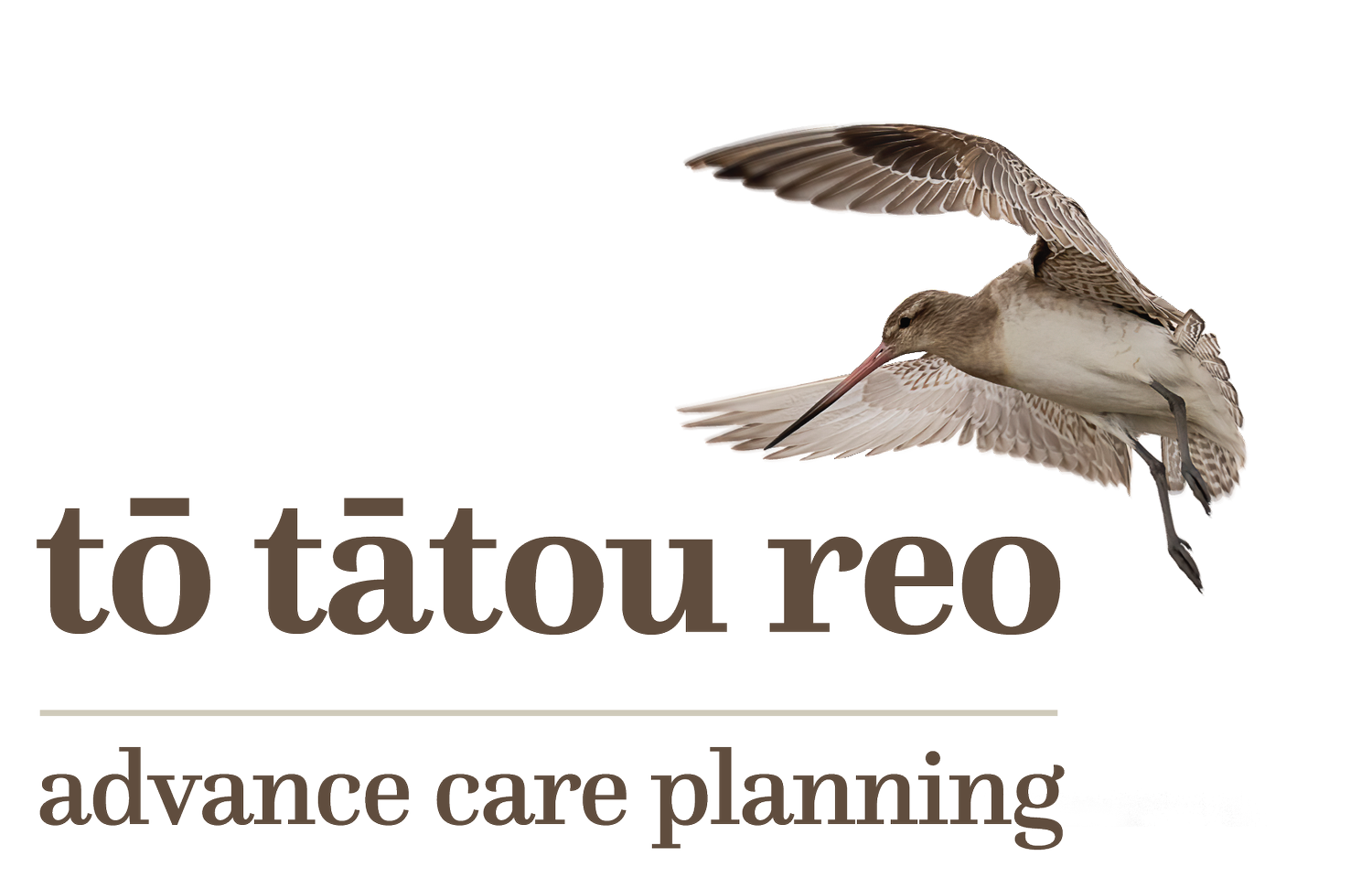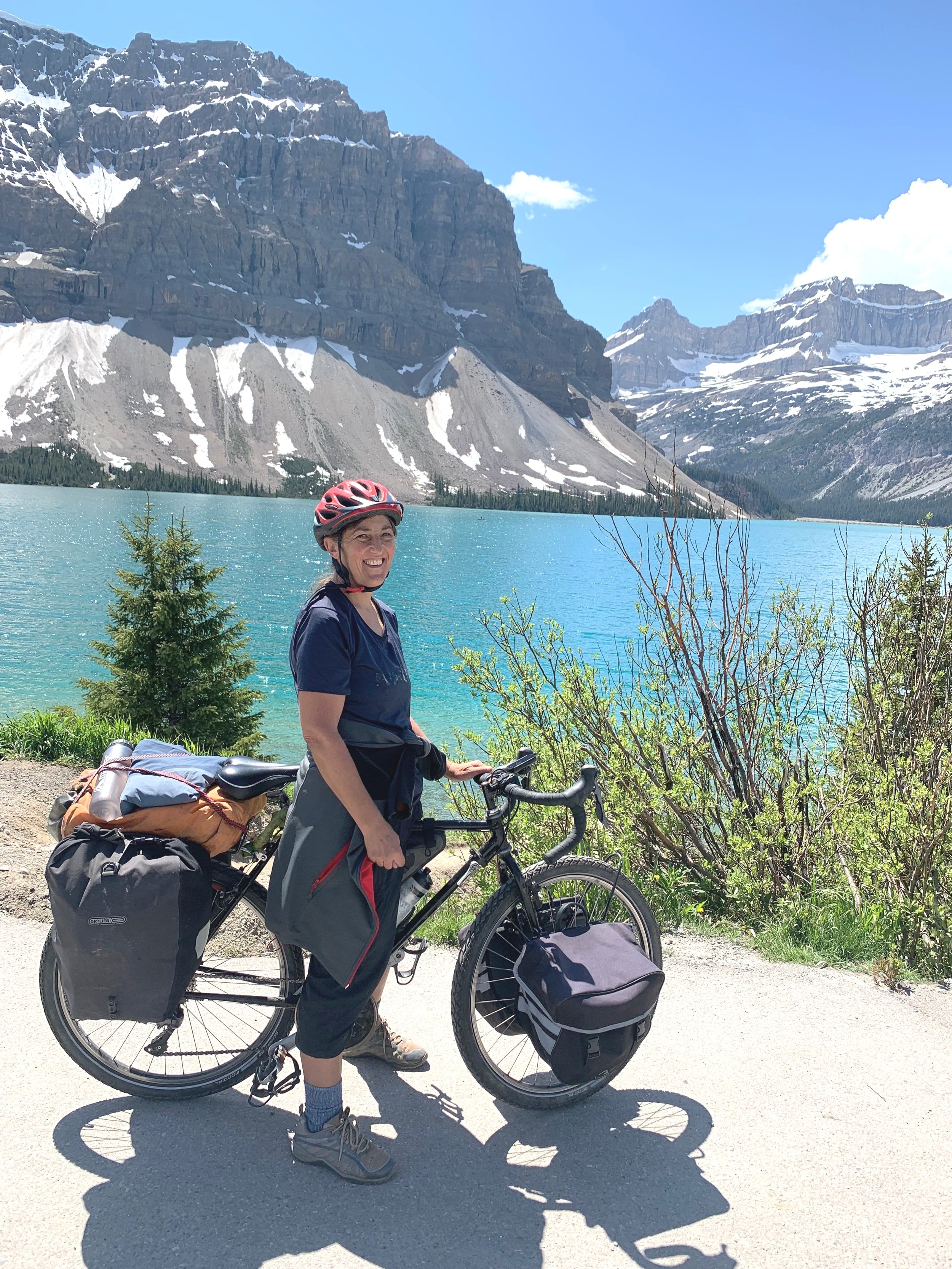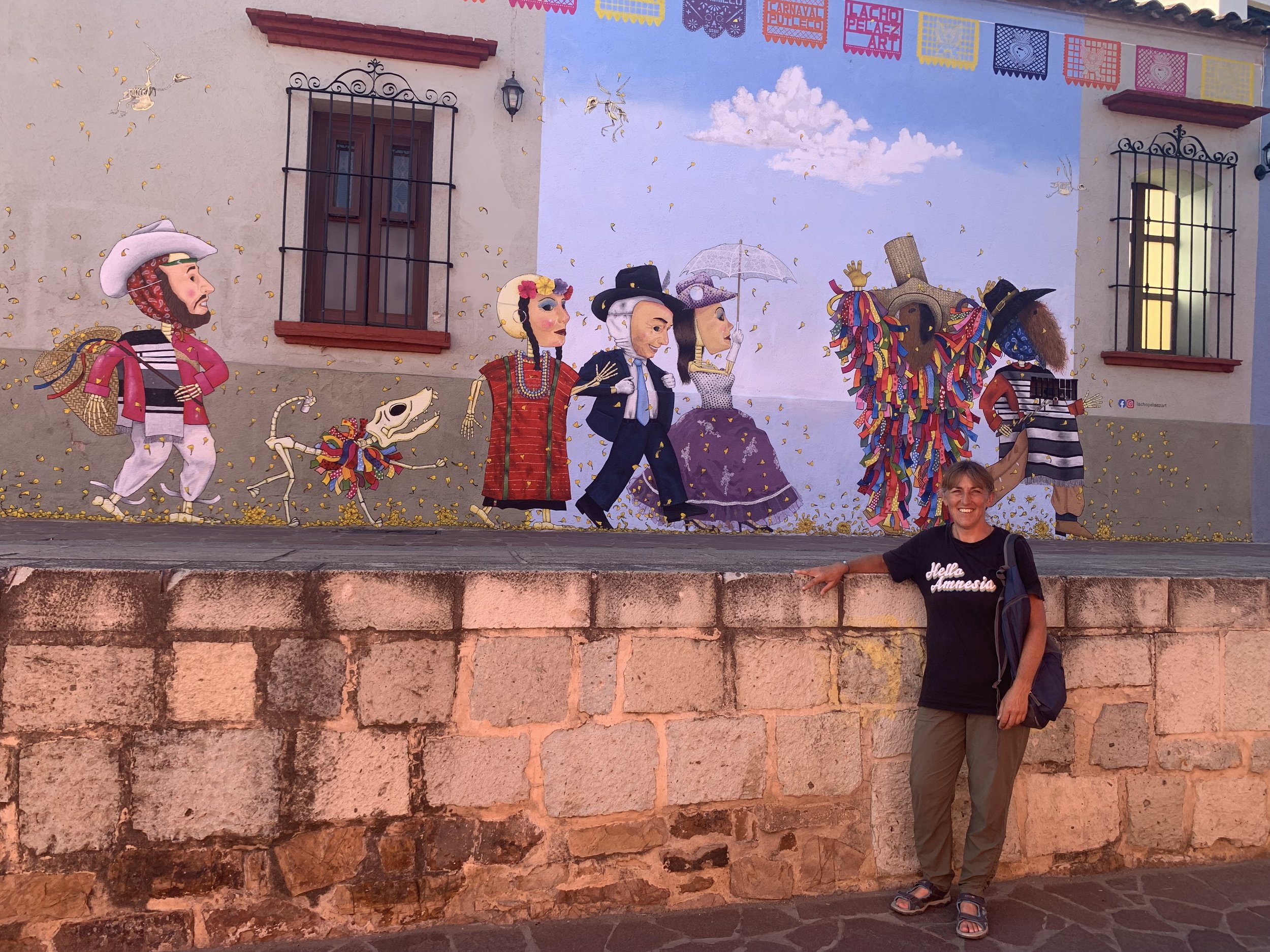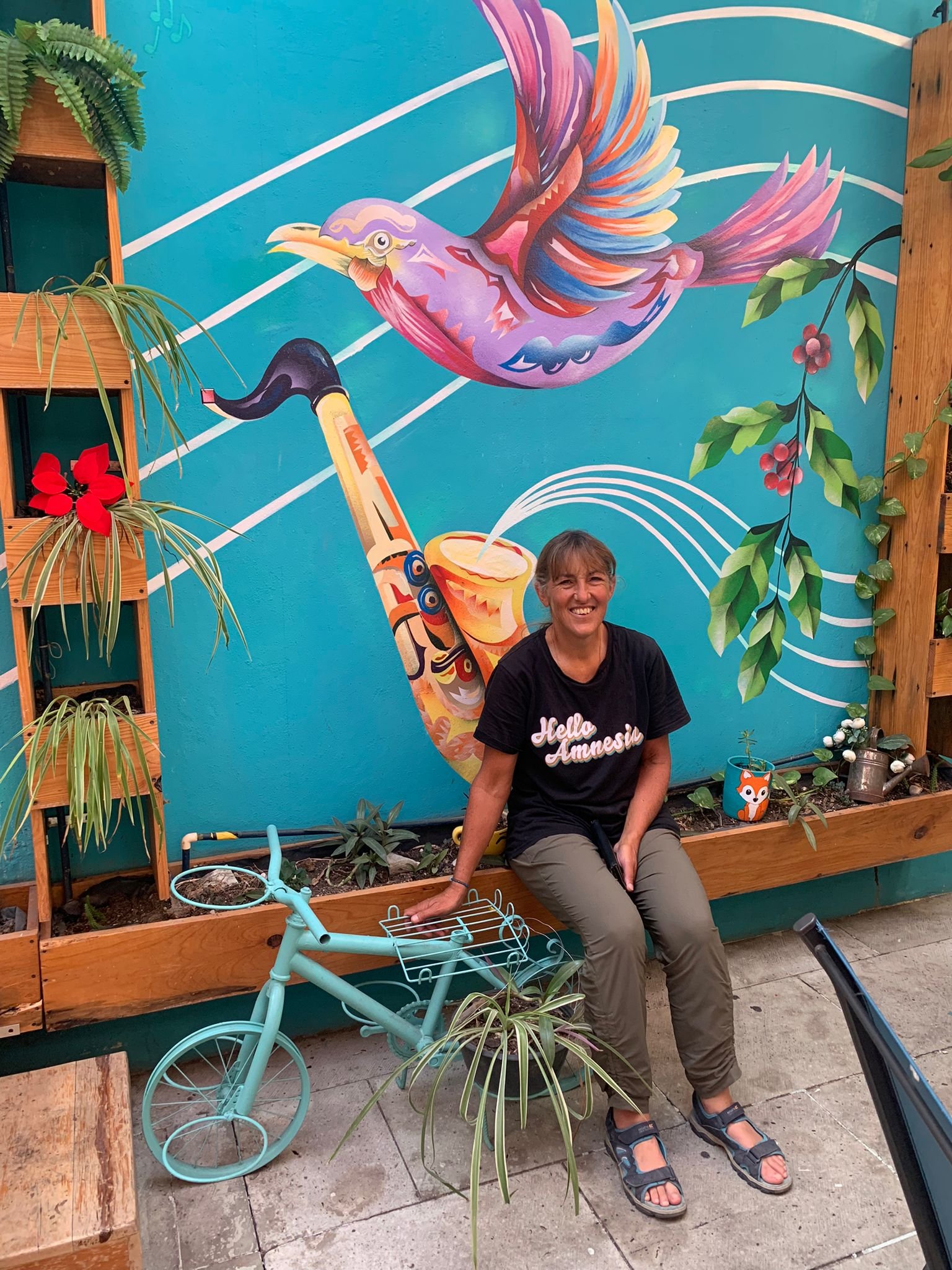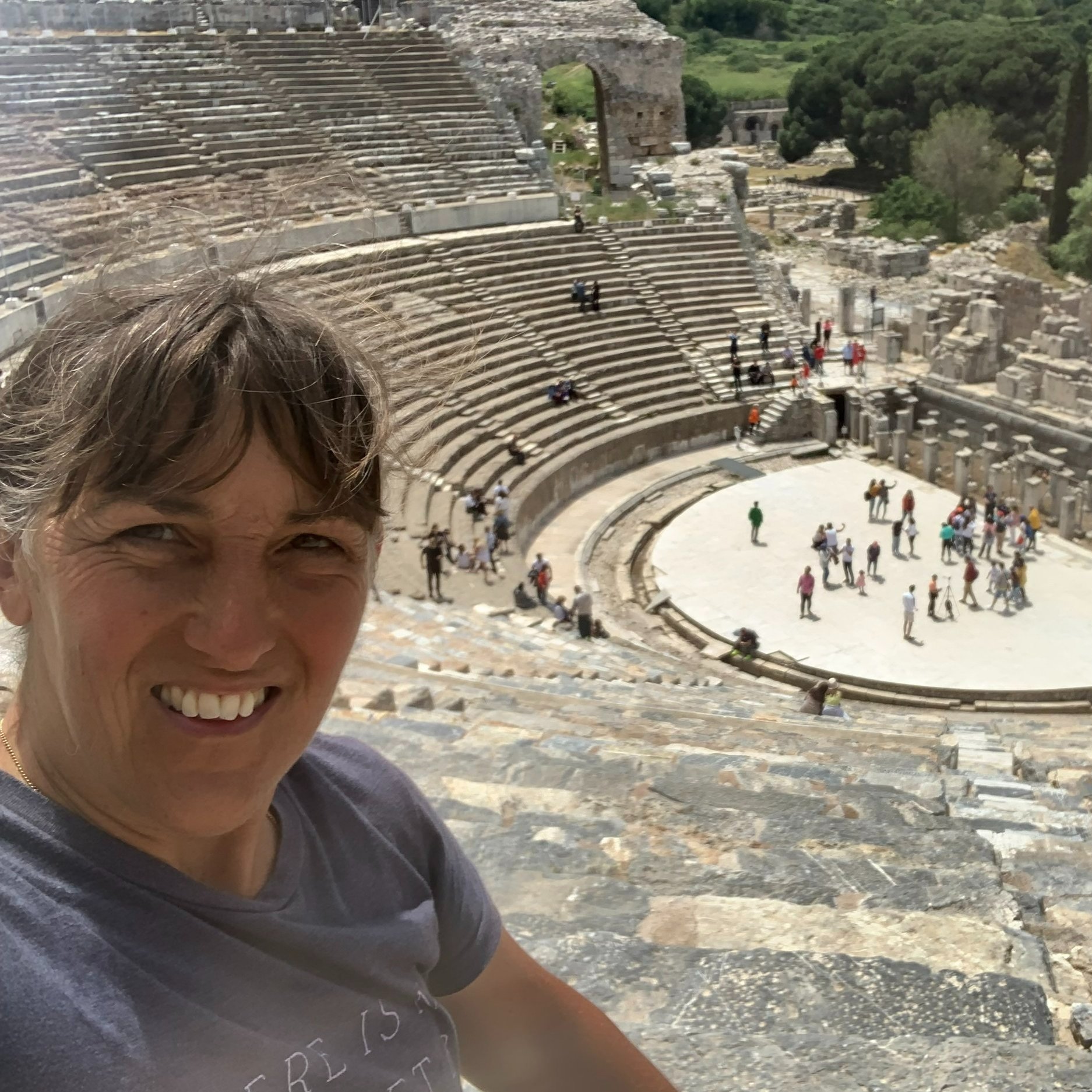Illness is part of life’s journey, not a new identity
Content notice: This article deals with sensitive topics including death and cancer
You never really know how you will react to a situation until you are in it, but it certainly helps to have a plan.
This is what adventurer, mother and palliative care nurse practitioner Carla Arkless discovered after a cycling trip around the globe was cut short by a terminal cancer diagnosis.
Throughout her career, Carla has supported and promoted advance care planning (the process of thinking and talking about your values, goals and preferences for health care and end-of-life care), which gives her a unique perspective on this chapter in her life.
The advance care planning process has helped Carla focus on living and what brings her joy, and she wants to share her story to help others do the same.
‘This illness is something I am moving through, not trying to fight, or go around or get rid of. It’s part of my life’s journey … Every day, I experience a little more light up ahead – sometimes it’s dazzling!’
- Adventurer, mother and advance care planning advocate Carla Arkless
Putting patients in the driving seat
Carla was drawn to the concept of advance care planning early in her palliative care career, when she recognised that patients were not always in the driving seat when it came to their health care journey. ‘Nobody had ever asked them what they would want to happen if they got more unwell or had an acute event, and so, if a crisis occurred, it would often cause additional stress for the whānau and patient.’
Advance care planning involves thinking about, talking about and potentially writing down what matters to you – including how you would want to be looked after if you couldn’t direct your own care. It’s a way of developing more awareness of what’s important to you in your life, Carla says.
‘So, if you’re ever in a situation where you have to make significant health care or lifestyle decisions, you’re not thinking about this for the first time.
‘I started to ask people about their priorities, before I even knew the term advance care planning, so when I saw an opportunity to get involved in the national advance care planning programme, I jumped at it.’
What is advance care planning? (myacp.org.nz)
From globetrotting to supporting palliative care in Aotearoa New Zealand
Carla was born and raised in the UK and trained as a registered nurse straight out of school. After travelling and doing agency work for a few years, she started working at a hospice in Essex, where her career in palliative care began.
She was drawn to Aotearoa New Zealand after visiting on a backpacking trip with her then-4-year-old son, Sean. When Sean was seven, the pair moved to the South Island, where she worked in the hospice and aged-care sector across Southland and then in the Nelson Tasman districts. Carla played a big part in supporting the development of advance care planning in Aotearoa New Zealand and training others to do the same.
Cycling round the world
In December 2021, the travel bug bit again, and Carla left Aotearoa New Zealand to cycle the world, visit family and volunteer at an elephant orphanage.
‘From January to April, I cycled through Portugal, Spain, Italy and Greece before taking a month’s break to participate in a volunteer project in Zambia. This was with Game Rangers International, which is a conservation organisation doing great work with rescuing and re-wilding orphaned elephants, working with communities, schools and the national parks,’ she said.
(Above) Carla’s adventures with Game Rangers International in Zambia where she helped with re-wilding orphan elephants and community education.
She then collected her bike from Greece and headed to Turkey. Her cycling adventures took her to Canada, going from Calgary into the Rockies, across to Vancouver, up the Sunshine Coast, to Washington State (via ferry) and down the West Coast of the United States, with in inland diversion into Central Oregon. She cycled to San Diego, Mexico and down into Central America – Guatemala, El Salvador, Honduras, Nicaragua, Costa Rica and Panama, then flew over to Columbia because she couldn’t get there over land.
‘There is more good in this world than bad’
The first three months of cycling were tough for Carla. ‘I wasn’t very fit, and it was all a bit new! At first it just felt like a holiday, but after a month it began to feel like a new way of life, with frequent challenges. Different challenges to ‘normal life’– but no less demanding.
‘The most memorable thing about the whole trip was the people I was fortunate enough to meet. The kindness of strangers was so evident. It really made me realise there is more good in this world than ‘bad’. I was regularly blown away by offers of accommodation, food, drink (being handed a bottle of cold water in the desert was pure luxury!) or just conversation and interest in the trip. Some people I stayed with for a few days, some I chatted to for a few minutes – many have kept in touch and have followed my story and sent the most kind messages. I feel like I have a whole community of people around the world that I’m connected with, and I feel like I’m much more able to connect authentically with people than before I left home.’
‘I feel like I have a whole community of people around the world that I’m connected with, and I feel like I’m much more able to connect authentically with people than before I left home.’
- Carla Arkless
When things don’t go to plan
From Colombia, Carla’s plan was to cycle all the way down to Ushuaia in Patagonia. However, abdominal pain meant she only managed to cycle for three days before becoming too unwell to continue. She was diagnosed with kidney stones.
‘I got the bus to the nearest big city, Medellín, and then flew back to London to recuperate for six weeks before heading back to continue – at least that was the plan.’
After about a month of being back in the UK Carla’s abdomen was growing more distended and she began to suspect there was something more going on than kidney stones.
An initial CT scan showed an ovarian mass. After further tests Carla was diagnosed with ‘pseudomyxoma peritonei with pleural involvement’ – a rare kind of cancer that usually originates in the appendix. ‘At some point the cancer cells are released into the abdominal cavity where they slowly multiply and, in my case, eventually attached themselves to my right ovary.’
Carla’s choice
Carla was referred to a specialist team in the UK and saw a surgeon in early June.
‘I was offered extensive, non-curative surgery with a 3–5-month recovery time, which may have given me up to a couple of years problem-free. There were no guarantees, and the cancer would re-grow at some point. Without surgery he said I would run into real problems with nutrition in 1-2 months (as it turns out it was over 3) and have a likely prognosis of 3-6 months.’
Carla chose not to have the surgery, and instead to focus on palliative care.
‘Time was not something I felt I needed to extend at all costs. I’ve done a lot of living and if time was short, then that was okay with me – although my preference was definitely not to die just yet! This is something I had thought about while writing my advance care plan, which very much helped with the actual decision-making.’
‘I’ve done a lot of living…time was not something I felt I needed to extend at all costs’ - Carla Arkless
Because extending time wasn’t a priority for Carla, she wanted to have as little to do with the health system as possible and focus on living rather than the illness. ‘I didn’t want to be reliant on health care staff and procedures.’
Carla has a strong belief in the link between the emotional, spiritual, and physical and feels healing is supported by outside therapies and treatments, rather than driven by them.
‘While I accepted that I might die and I was okay with that – I felt that if I was going to have the best chance of healing, I would be more likely to succeed without the surgery,’ she said.
What matters to Carla
Advance care planning is all about what matters to you, and what matters to Carla is love. Love for her son, and the world.
‘I raised Sean alone from a baby, so he has always been central to my life, and we did a fair amount of travelling together. He left New Zealand to go travelling when he was 19 and ended up moving to London where he did a music degree, which he completed last year.
‘He now runs a project management company called SJARK, as well as fronting a rock band called Hello Amnesia, and has just started a master’s degree in musical theatre with the Mountview Academy of Theatre Arts. Obviously, I’m a very proud mamma! (Although I do hope he doesn’t become a workaholic like his mother!)
‘Central to what’s important to me, aside from Sean obviously, is to work at being the best person I possibly can and to help increase the love in this world, which I have learned involves much internal work. My connection to the world, and other people, is important to me and I am very mindful of my impact on the environment.’
Making tough conversations easier
The advance care planning process gave Carla the chance to consider her priorities and values while she was well.
‘If I had not thought about these things ahead of time, the whole process of decision-making would have been much more stressful and difficult, and I don’t think I would have had so much control over what eventuated.’
‘If I had not thought about these things ahead of time, the whole process of decision-making would have been much more stressful and difficult.’
This gave Carla confidence to have tough conversations with the surgeon she was referred to.
‘The surgeon seemed to assume that I would accept the extensive surgery he was offering, which could give me up to an additional couple of years. But because I had figured out my priorities, I was able to question him, and I ended up declining the surgery.
‘I think because my worldview is a bit different to the majority, having the opportunity to consider things ahead of time, when well, was especially useful – being able to articulate why something is important to you, while being encouraged to consider significant treatment you may not want, helps health care providers better understand where you’re coming from – making it more likely they will take your views into account.’
Living life rather than managing an illness
Sean and Carla in their new backyard. Photo: Ben Stewart photography
Carla was referred to the palliative care service and sees a nurse infrequently, although she can contact them at any time. She sees a general practitioner monthly to get prescriptions if needed and to avoid involving the coroner if she dies.
‘Otherwise, my life is pretty free of the health care system. I am just living my life (albeit a very different life than I envisaged!) rather than managing an illness. Psychologically this is so important, and I keep thinking we don’t place enough emphasis on this in health care.’
‘The abdominal mass continues to grow, and I now have oedema (fluid build-up) in both legs and up to the mid abdomen. The tumour and fluid add up to about 25kg (maybe a bit more) I’m much bigger than when I was nine months pregnant … I think I look ten months pregnant with full size triplets!’
‘I am just living my life…rather than managing an illness. Psychologically this is so important, and I keep thinking we don’t place enough emphasis on this in health care.’
Despite all this, Carla says her energy levels remain good. ‘I think the fact that I was super fit when all this started has really helped.’
She and Sean have moved into a new apartment together so he can take care of her if he needs to.
‘We’re really enjoying the time together. Since moving to this environment, I have improved in many ways – not medically speaking, but I am more active, feeling more positive, and bothered by symptoms less,’ she said.
'This illness is something I am moving through, not trying to fight, or go around, or get rid of. It’s part of my life’s journey and I am learning a little more each day to fully embrace it, and let it take me where it’s meant to. Every day I experience a little more light up ahead - sometimes it’s dazzling!'
Learning her wishes hadn’t changed
Carla has reviewed her advance care plan a few times but made very few changes since she first filled it out, even after the cancer diagnosis.
‘That was very interesting for me, as you never really know how you will react to a situation until you’re in it. Of course, I imagined the scenario of being diagnosed with a terminal illness many times (fallout from being a palliative care nurse I think!) and I have essentially reacted the way I thought I would.’
‘I imagined the scenario of being diagnosed with a terminal illness many times… and I have essentially reacted the way I thought I would.’
Start with what’s important in your life
Carla’s advice for those thinking about advance care planning is to think about what living means to you.
‘Start with what’s important in your life as a human being. What does living mean to you? What are your values? What brings you joy? When diagnosed with a serious illness it is really easy to lose sight of these things.
‘Focusing on living and wellness and joy makes the illness part secondary. Illness is a part of life’s journey, not a new identity.
‘If you’ve thought about it, and maybe even written it down, you are more likely to remember that there are good things in life when your world seems to be falling apart with an illness diagnosis.’
Carla suggests people include things in their plan that don’t rely on being fit and active. ‘Like enjoying ordinary moments with someone special, or the smell of certain flowers.’
The next step is to consider those things that would take priority if you had a serious illness or time might be short, she says. ‘If you don’t start with a foundation of living then this question can feel quite negative. If you start with a foundation of joy and happiness in living then this question is just part of the whole picture, not the focus.’
‘Focusing on living and wellness and joy makes the illness part secondary. Illness is a part of life’s journey, not a new identity.’
- Carla Arkless
Photo: Ben Stewart photography
The next adventure
Update: Carla’s next adventure began on Friday 6 October, 2023. She was able to see this story and share it far and wide before she died, and we are so honoured to have been able to help her make that happen. We will leave the last words in this piece to her:
‘If you’re reading this, it means I have passed on to the next adventure. Thank you to all of you for your support, your prayers, and your love. It has meant the world to me.
If anyone would like to do something special in my memory then please consider a day, a week, a month (or whatever) without buying plastic, without eating commercially produced meat, dairy, or eggs (even free range!), without using your car, or something else to support the recovery of our beautiful planet.
Make memories with people you love, out in nature; breathe with the trees, smell the flowers, feel the connection we all have with the natural world. Don’t wait to do stuff you want to do. You never know when you’ll no longer have the chance. Embrace life!’
